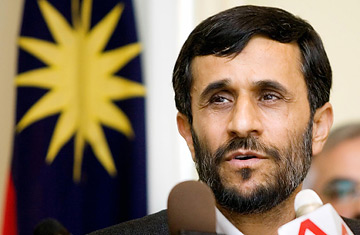
Mahmoud Ahmadinejad
President George W. Bush urged America's allies Tuesday to keep the pressure on Iran despite the U.S. intelligence having concluded that Tehran has not had a nuclear weapons program since 2003. "Iran was dangerous, Iran is dangerous and Iran will be dangerous if they have the knowledge necessary to make a nuclear weapon," Bush told a press conference in Washington. "The best way to ensure that the world is peaceful in the future is for the international community to continue to work together to say to the Iranians: 'We are going to isolate you.'"
But in Europe, officials are already struggling against the feeling that the air has gone out of the balloon following Monday's release of the U.S. National Intelligence Estimate on Iran. In recent weeks, the permanent members of the U.N. Security Council and Germany had been trying to hammer out a new set of sanctions aimed at persuading Tehran to suspend its uranium enrichment program and cooperate fully with investigators from the International Atomic Energy Agency over questions about its clandestine nuclear program prior to 2003. As recently as last weekend, senior diplomats from those countries met in Paris to debate a new set of measures. But spurring the urgency behind those measures was the U.S. argument, backed by most Europeans, that Iran was running a secret weapons program. Now, says Ali Ansari, director of the Institute of Iranian Studies at Scotland's University of St. Andrews, "the E.U. and the Security Council are in a bind. They went down this road [of imposing sanctions on Iran] because they felt that Iran had a weapons program. [The new U.S. report] complicates matters."
E.U. and U.S. officials insist, nevertheless, that they will press ahead with efforts to agree on new sanctions in the U.N. Security Council. But, conceded one official on condition of anonymity, "the sense of urgency has gone."
The National Intelligence Estimate, or NIE, compiled every two years, reflects the consensus among the 16 branches of the U.S. intelligence community. This week's report judged "with high confidence" that Iran shut down its nuclear weapons program back in 2003, reversing the findings of the 2005 NIE on Iran. U.S. officials have yet to disclose, even to their allies, precisely what intelligence may have led to the change of view. (A classified version of the NIE is said to contain up to 1,000 pieces of information in footnotes, including a telephone call in which an Iranian general expresses exasperation at questions about a program that he says stopped years before.) But while asserting that Iran may no longer have a weapons program, the new report also stresses that Iran is continuing to try to develop the technique to enrich uranium on a massive scale and that it could, theoretically, manufacture enough highly enriched uranium, or HEU, to build a bomb "during the 2010-15 time frame." (Iran says it is enriching uranium for peaceful purposes to use in energy production and does not intend to make any HEU; the NIE says it cannot assess Iran's ultimate intentions.)
Key European governments were given a peek at the new report prior to its publication on Monday. Following its publication, they joined their U.S. counterparts in reiterating the demand that Iran comply with U.N. demands and prove its program is benign. Iran has admitted to running a clandestine program until 2003. "There are still many open questions, including its uranium enrichment program, which Iran is running despite not having any apparent civilian use for it," said a German official. "Until we have complete confidence that their purposes are 100% peaceful, we should not let them off the hook."
Officials admit that the report may have removed a sense of urgency from the current effort to compel Iran to cooperate fully with the international community, but the easing of tensions over the program and the diminishing likelihood of a U.S. military strike on Iran — an option that Europeans have strongly opposed from the beginning — more than compensated for the loss. Some argued that the easing tensions could also boost the chances of consensus in the future. Russia, for example, which chafed at U.S. calls for tougher action against Iran allegedly out of concern that it could trigger another war, may now be more inclined to see "eye to eye" with the Europeans and the U.S., said one German official. "They have their own assessments of the risk posed by Iran and their own reasons for wanting a solution," he said.
Mohamed ElBaradei, director general of the International Atomic Energy Agency, also welcomed the report, which he said would help "defuse the current crisis." ElBaradei on Tuesday urged "all parties to enter without delay into negotiations to ... bring about a comprehensive solution that would normalize the relationship between Iran and the international community."
Overall, the report is being greeted in Europe as "good news", according to Henning Riecke, a proliferation expert at the German Council on Foreign Relations in Berlin. The substance of the report — the judgment that Iran is not currently engaged in building a bomb — means "we have more time" for negotiation, he said. But "the current pressure on Iran should not falter under the impression of one report," he said. The biggest surprise in Europe was less the findings themselves, but the fact that they came from the U.S. intelligence community. Washington had been identified with the most alarmist assessment of Iran's capabilities. No longer.
with reporting by Vivienne Walt
